Like many people, I’d never even heard of Lashana Lynch. Not until the Twitter feed started bubbling. “Tag!” said someone. “You’re it. Signed, the Doctor Who fandom.” The cause for this consternation? The shocking announcement concerning a crucial piece of casting news for the upcoming Bond 25, in which the chiselled assassin is replaced by a 31-year old black actress – or, as the internet dutifully screamed, “THE NEW BOND IS A WOMAN!”.
She isn’t, of course. The new 007 is a woman, but that’s not the same thing at all. 007 is a code name – a number assigned to a particular designation in the Secret Service, the number of buses you have to catch to get from West Lothian to Brighton, or my current tally of tumblr subscribers. Bond, you see, having left MI6, has relinquished his number to a new agent, who is then sent to bring him back into the fold when a new problem (presumably involving Blofeld) rears its ugly head. It’s the same sort of scenario as someone taking on your phone extension when you switch office departments, and about as interesting. But of course, none of this matters if you can craft your headlines properly: you just see the words ‘new 007’, and the damage is done and the ambulance chasers are already sharpening their quills.
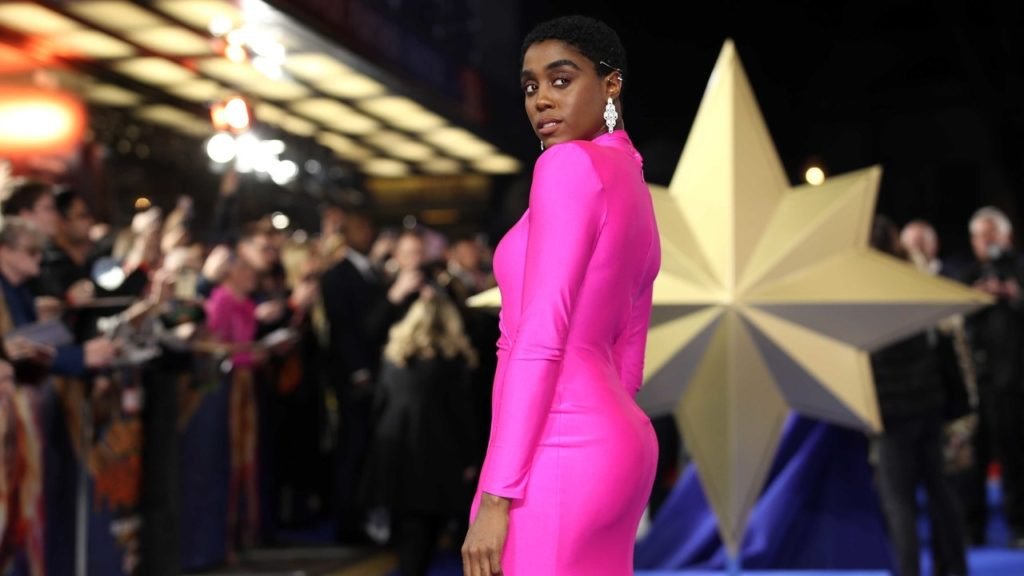
Before we go any further, here’s an incredibly important disclaimer, and no matter how much of the rest you opt to skim, it is vital that you digest these next two paragraphs. As we go to press, this little media sensation is currently nothing more substantial than a tabloid rumour. It appeared first in the Sun or the Mail (it is difficult to tell, even if you look at the timestamps, exactly which is the chicken and which is the egg) and then all hell broke loose. There have been thinkpieces and info pieces and cheering and harrumphing in equal measure. Even the Guardian have jumped on it. But it exists, currently, in a quantum state, both true and not true, fact and sensalionist fiction, the unnamed ‘source close to the film’ the sole observer in the lab, where Pussy Galore is presumably waiting inside the box.
This is all well and good but it places us in an awkward moral dilemma, because by and large we don’t do tabloid rumour over at the DWC, and we always approach a story like this with a degree of caution. I say caution, rather than outright dismissal, because for all the guffawing over the occasional clanger (Kylie’s supposed casting as “a sexy Cyberwoman” springs immediately to mind) tabloid rumours have an annoying tendency to be correct. And while we don’t know if this is fact, it’s being reported as if it is, and it’s exactly the sort of thing they’d do right now and it has opened up a colossal can of worms – which, incidentally, is sometimes the only way to catch fish. And thus in what follows we will treat it, purely for the sake of the argument, as if it is true – and more to the point, true as written – because if it is true then this is a good opportunity to discuss something important, and if it is false then the only one left wiping egg from their face is going to be me.
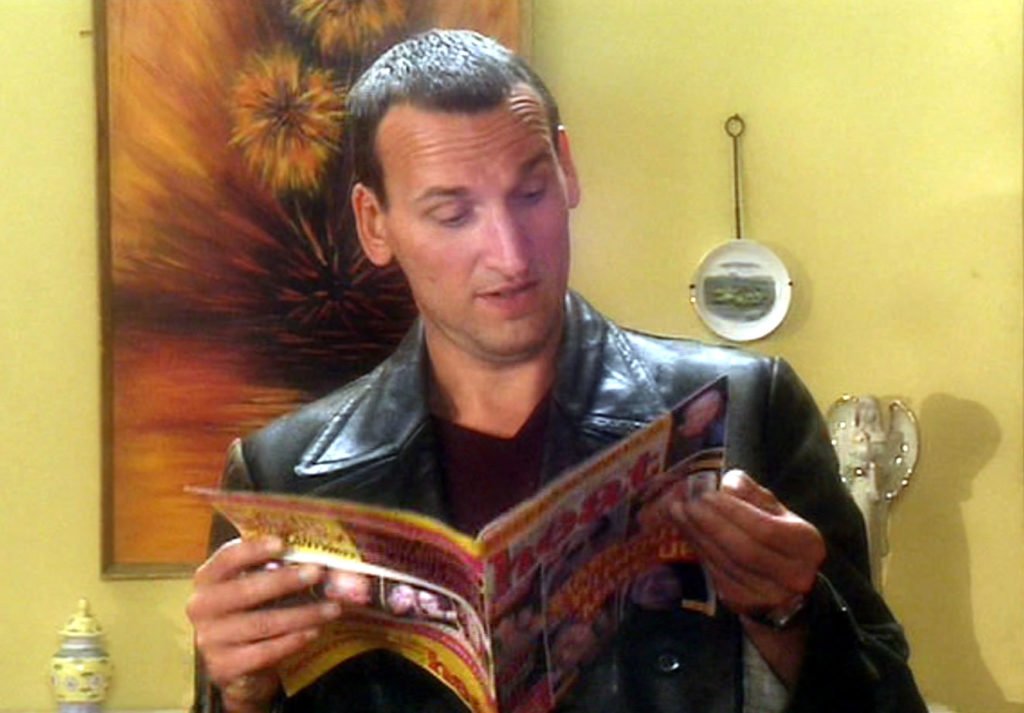
Here’s another disclaimer: I’m writing this as a fan not only of Jodie Whittaker (we’ll get to her) and the last Ghostbusters film, but also as someone who is open to the idea of a female Bond. Why not? It’s not like we haven’t already abandoned the original concept. The Bond of the books is a misogynist, racially prejudiced thug: Pierce Brosnan punching out a cigarette-smoking guard with the words “Filthy habit” he is categorically not. Daniel Craig went some way towards reviving the brashness of the early novels, but within the confines of certain parameters Bond has always been something of a chameleon, and there is no reason on God’s earth that a female incarnation couldn’t work in the hands of a decent writer. (I’ve had numerous arguments about it with people over the years, and one guaranteed way you can win them is to call their bluff. So when someone suggested a male Catwoman, as if assuming I’d find this too horrific for words, I admitted I was actually open to the idea, and he suddenly went very quiet.)
But there is something crass and unpleasant about this whole scenario. For a start, Lynch isn’t playing Bond: she’s playing the person who has to bring back Bond for one last job, the sort of role that went to James Olson or Richard Crenna in the ’80s. Having delivered said message, she then presumably trots into the sunset like the good obedient subservient she is scripted to be. Or she’ll be dead by page 27, her screen presence swiftly neutered once the shock value has worn off. If we’re lucky, she’ll get to live, and she’ll fight alongside Bond: nonetheless there is room for only one 007, unless you make her 007A, and then the whole thing just gets silly.
I can even see how it’ll unfold. We’re assured that seduction will be involved – the insider describes it as a ‘pivotal’ scene, which is surely a pun – and Bond will presumably be in the middle of pouring a gin and tonic when he becomes aware of movement behind the curtain of his luxurious Jamaican apartment. Enter Lynch; there is banter. Bond will say “I’m retired”, and then try to snog her. She will say “The rumours about you were true, then,” and at some point will slap him in the face. There’ll be a little bit of close quarters combat, calling to mind that ridiculous scene in the stables in A View To A Kill, and then we’ll tastefully cut to the two of them lying in bed, Lynch drenched in sweat (Craig, of course, is dry as a bone), the moonlight reflecting off the ocean. Bond lights up a fag. “Well,” he mutters. “It’s been a long time since I made love to myself.”
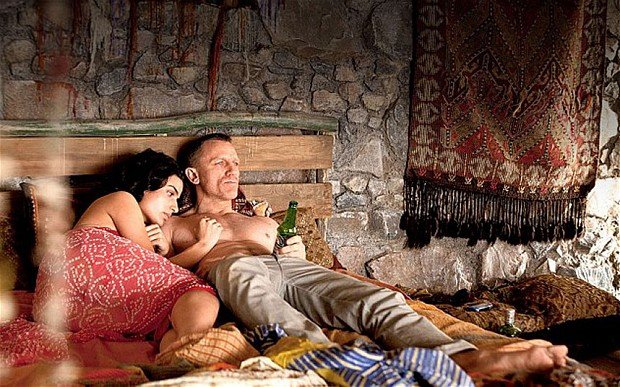
The Doctor Who connection may be tenuous at best, but it’s hard not to draw a parallel. We’ve been through the wringer these past 2 or 3 years: from the fevered anticipation of whether it would be Kris Marshall or Cate Blanchett to Chibnall’s deflection about not wanting a female Doctor to be a gimmick, to the moment when, during the Wimbledon final, we saw the boots and the hands and then the hood went back and there was an intake of breath and then a collective scream across large parts of the world. It was a game-changer, and the fandom has never been the same (or quite right) since it happened.
Still, there is a sense of development here. Those in heavy favour of the Doctor’s transition to female look back to The Curse of Fatal Death as the first real ‘proof’ of regenerative gender switches, citing Lumley’s smouldering turn as a very early sign of Moffat testing the waters of viewer acceptance. Surely (the argument runs) if the Doctor can do it then, he can do it now? The problem with this theory is that it’s very difficult to look at the ending of Curse as anything but the punch line to a 5 minute joke – the Doctor switching bodies with as much abandon as Lalla Ward, finally coming back as a woman. Why else would you include a vibrator joke?
15 years on from Curse, everyone had more or less forgotten about it – but the gears don’t really start shifting until Dark Water, just before they slide into overdrive in Death In Heaven. Not content with turning the Master female – Moriarty becomes Mary Poppins – it seems, in the opening minutes of the Series 8 finale (not least its opening titles), that they’re about to go the whole hog and turn Clara into… actually, what was the point of all that, now that I think about it? Having Clara pose as a false construct, a work of fiction? Why on earth did they think that would be a good idea? Who’s she trying to kid – the Cybermen, or us?
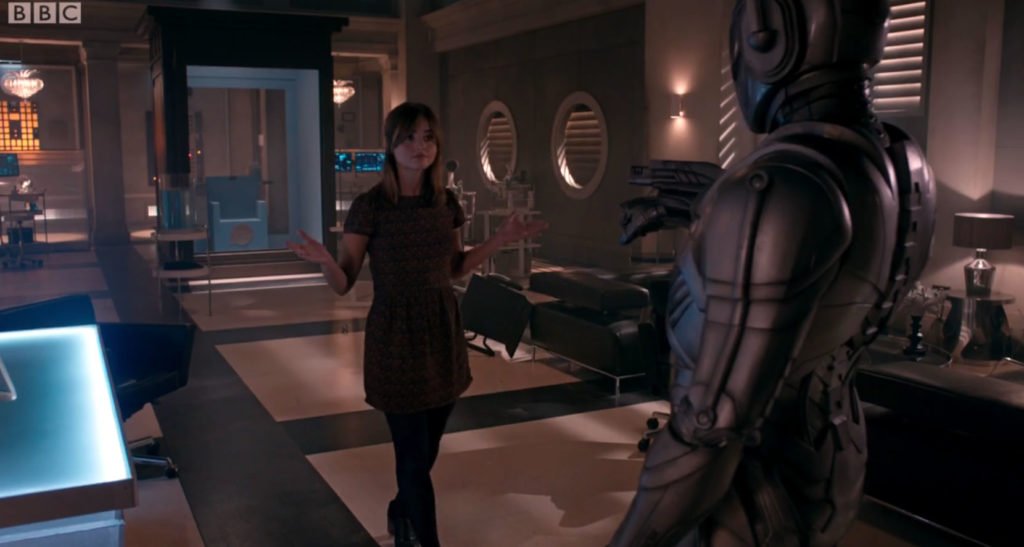
But if there’s one thing Moffat knows how to do, it’s troll the fandom. River teasing the Doctor about the TARDIS brakes? Check. Gags about the Doctor / Doctor Who thing? Check. Derren Brown references in Sherlock? Also check. (He’s in good company with this one; when it comes to manipulating an audience Brown is up there with Richard Curtis.) In the 21st Century digital world, where viewers have a closer relationship with the writers and creators of the shows they love and hate than ever before, it’s more tempting than ever to see TV production as a two-way process, where the fans actively get to influence things, for better or worse. It’s never as simple as that, but if there’s one thing I’ll say for contemporary Doctor Who, it’s that it no longer exists in a vacuum.
Was Jodie Whittaker’s casting a shameless concession to Woke culture? We may never really know: even in the Classic documentaries you never get the whole story, and the lens through which past events are viewed tends to have a myriad different filters depending on who you’ve got telling stories. Never mind the hype – what actually happened in 2017? A much-needed change in direction? Needless pandering to social justice warriors and political correctness? Or Chibnall lifting the Do Not Enter sign so his mates could come in? Still, here’s an entirely subjective possibility: that despite some strong writing in Series 10, Doctor Who was on the sort of ratings and publicity slide that urgently necessitated a shot in the arm. And the arrival of the Thirteenth Doctor certainly gave it that – even though it could be argued, had you the time and inclination, that the chemical cocktail pumped into the show’s ailing bloodstream ultimately did more harm than good.
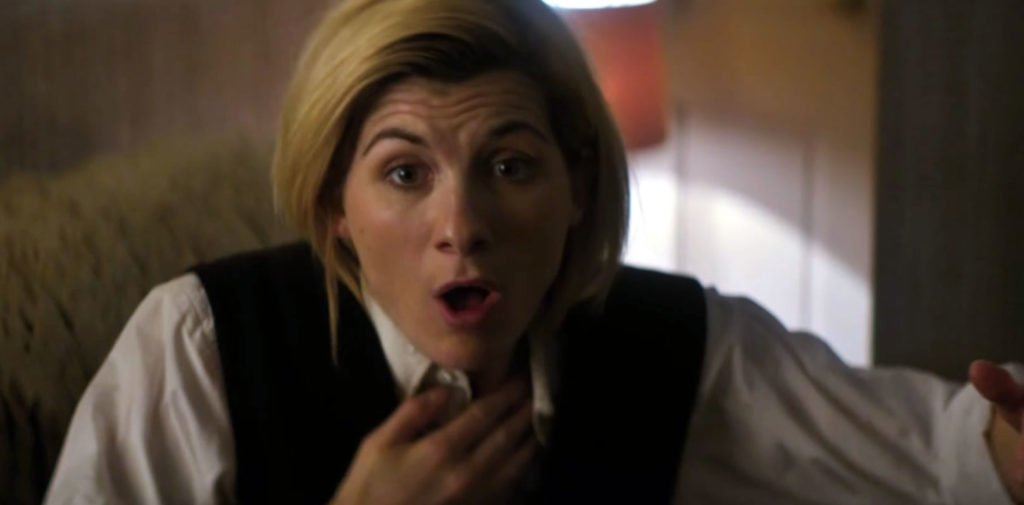
The diehard fans don’t like theories like this. Doctor Who was stronger than ever under Moffat, they’ll insist. The lines only ever go up. But Moffat knew this was coming. In terms of gender equality, Chibnall is the Messiah – although many people currently seem to see him as the Antichrist – but Moffat himself must surely have landed the role of John the Baptist, paving the way not only with Missy, but also with nods to the Corsair and regenerating generals (the first time, lest we forget, that it happened on screen) and gags from unreliable narrators about the Doctor being a little girl. It all comes to a head in The Doctor Falls, and the banter between Capaldi and Simm speaks volumes: when the Master sneers “Is the future gonna be all girl?”, the Doctor barely skips a beat before snapping “We can only hope”.
You see? It works, for better or worse. I’ve written elsewhere about the dangers of trying to compile all of Doctor Who into one seamless continuity, because you really can’t do it, but there is that sense of progression, of building to this moment. You might level the same sins I’m hurling at Universal against the BBC – but at least they made a token effort to work up to it, rather than simply jumping on the Woke train as it’s pulling out of the station. And you might argue, of course, that the endless rebooting of the Bond franchise allows for the luxury of casting a black woman and calling her ‘007’ without any sort of concession to silliness: Lynch’s presumed role in Bond 25 is entirely plausible, and consistent with the way the MI6 universe has grown and developed, but isn’t it funny that they’re just doing it now, when gender is on the front page of every paper? Is it a sudden realisation of collective responsibility, the notion that Girls Need Role Models Too (because no self-respecting young woman has ever pretended to be a secret agent until now, right?), the sudden need to remind the straight white men that women are just as good at this? Or are Universal’s motives rather less noble?
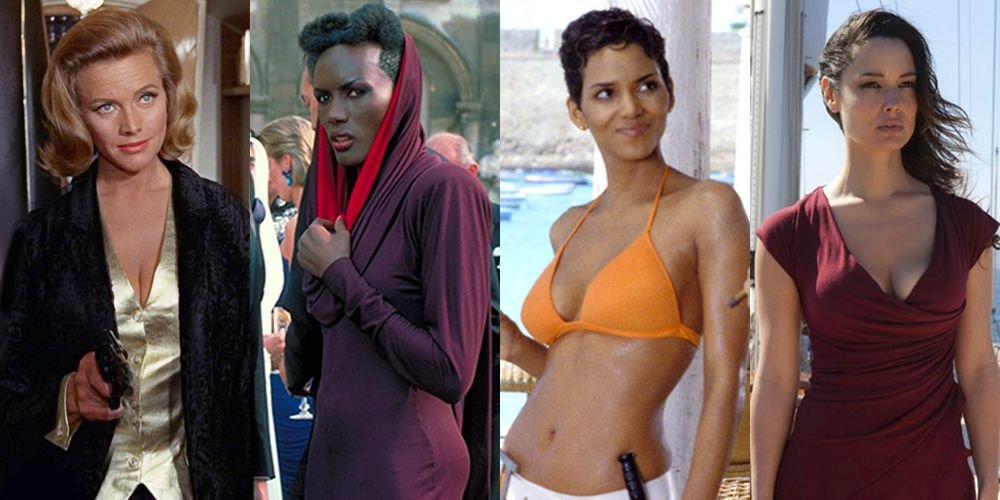
It’s almost certainly the latter. And in a way, it comes as no surprise: the Bond films have, for almost as long as we can remember, been all about marketing, for reasons I don’t have time to unpack but which ought to be obvious to anyone who’s ever watched Daniel Craig open a suitcase or glance at his watch. And perhaps this brazen approach to product placement is the reason we’re here – because it reflects a reality. It would be nice to think of Phoebe Waller-Bridge (the one who makes the papers, but one of at least five writers involved in this mess) perched at her workstation, tossing out ideas in between cappucinos, thinking “Ooh, I’ll put this in. It’ll be a little bit subversive, but also fun, and it’ll be an amusing joke that doesn’t necessarily have to mean anything”.
I could have lived with that, and it would be nice to think it’d happen that way, but there’s another picture that comes to mind: one of those film board sessions, hosted by the people from the Orange adverts, where they’re brainstorming buzzwords and developing an algorithm to determine the maximum amount of press exposure. “We’ll bring in a new 007,” they’ll say, “and we’ll cast a black woman. But Craig still gets to be Bond; that way everybody’s happy, even though it’ll take them a while to figure that out.” It calls to mind those pointless meetings in W1A where they’d argue about diversity and play verbal tennis (“Right” / “Great” / “Splendid” / “Triffic”) in order to tick as many boxes as possible. And sadly it is this image – rather than that of the lone writer with good intentions – which is gaining traction, because it is likely to be far closer to the truth.
We don’t actually know the truth – heck, I don’t even know if any of this is real – but when you look at the world around you it’s really not such a stretch. The lines between genuine altruism and self-serving marketing always become rather blurred when corporations get involved – all those big cheques on Comic Relief have something of a nasty tinge to them – but it seems it’s worse than ever lately, as our obsession with social media leads to a new and dangeous world, where brand image becomes more important than the issues it’s promoting. There’s an interesting and thought-provoking piece in The Spectator that touches on this very subject – the gentrification of corporate virtue signalling masquerading as responsible promotion. You saw it with Skittles, who produced colourless confectionery in July because “During Pride month, only one rainbow matters”. And it’s endemic in TV and film – not in the sort of casual, understated manner of something like Balamory (which never made a big deal out of things like this) but with a flurry of trumpets and a wave of Instagram stills. It is loud and proud. And I know I’m a straight white male who is used to seeing himself represented – but honestly, does it need to be? Can’t I just enjoy a Budweiser (if such a thing is actually possible) without being bombarded with the constant reminder that they’re paying lip service to human rights?
Perhaps this is the first step towards a new beginning, but it’s hard to see it. I could accept (I’ve had it thrown at me several times over the last couple of days) that this is a toe dipped into the water: that instilling a fake replacement is a litmus test to find out potential fan reaction, or even to begin that stage. And perhaps we shouldn’t be too hard on Universal for having a go: if it must happen, it must happen somehow. But there is a noxious odour to the way the Lynch rumour has been handled and developed, and one that is all too familiar to those of us who’ve seen it happen before, and who recognise the signs and patterns and the byline phrasings. And it is hard for the overgrown cynic within me to accept that this is anything but a crass, manipulative media stunt, orchestrated at all levels through deliberate leaks to maximise publicity for the new film and keep the press happy with a series of clickbait-friendly headlines, endlessly shared and retweeted and praised and slated in equal measure by people too stupid to read beyond them. Everybody wins, except for the middle ground.
Look. If you want to introduce a female Bond, just do it. It’ll be a trainwreck – not because it won’t work, necessarily, but because the vocal diehards will not allow it to be anything else – but at least it’ll be different. But please, Universal, spare us from this joyless gravy train of Woke culture, of controlled leaks and savvy casting decisions, where every progressive stance has to be a headline. It is tedious and crass and it insults the very people you’re trying to reach and empower; honestly, you can do better. Just make the films, and leave the smokescreens and subterfuge to Bond himself. Or herself. Whatever works.
